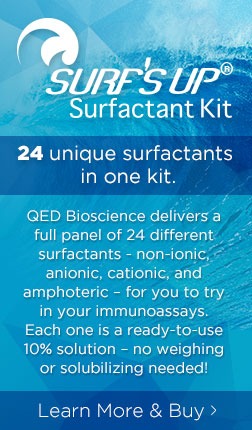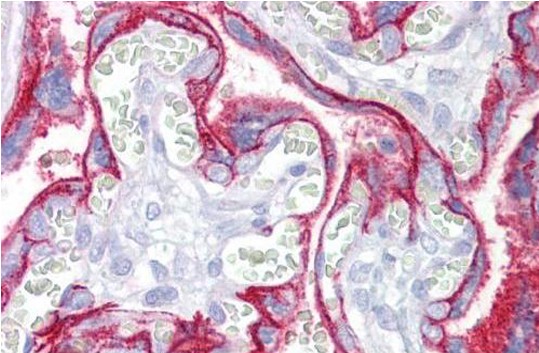Anti-CD46/Membrane Cofactor Protein Antibody (90004)
$520.00
SKU: 90004
Categories: Antibody Products, Growth Factors/Cytokines/Receptor Antibodies, Products
Overview
Product Name Anti-CD46/Membrane Cofactor Protein Antibody (90004)
Description Anti-CD46/Membrane Cofactor Protein Mouse Monoclonal Antibody
Target CD46/Membrane Cofactor Protein
Species Reactivity Human
Applications WB,IHC,ELISA
Host Mouse
Clonality Monoclonal
Clone ID 3F1
Isotype IgG1
Immunogen Recombinant human CD46.
Properties
Form Lyophilized
Formulation Lyophilized in PBS.
Buffer Formulation Phosphate Buffered Saline
Format Purified
Purification Purified by Protein A affinity chromatography
Specificity Information
Specificity This antibody recognizes human CD46.
Target Name Membrane cofactor protein
Target ID CD46/Membrane Cofactor Protein
Uniprot ID P15529
Alternative Names TLX, Trophoblast leukocyte common antigen, CD antigen CD46
Gene Name CD46
Sequence Location Cytoplasmic vesicle, secretory vesicle, acrosome inner membrane
Biological Function Acts as a cofactor for complement factor I, a serine protease which protects autologous cells against complement-mediated injury by cleaving C3b and C4b deposited on host tissue. May be involved in the fusion of the spermatozoa with the oocyte during fertilization. Also acts as a costimulatory factor for T-cells which induces the differentiation of CD4+ into T-regulatory 1 cells. T-regulatory 1 cells suppress immune responses by secreting interleukin-10, and therefore are thought to prevent autoimmunity. {PubMed:10843656, PubMed:12540904}.; (Microbial infection) A number of viral and bacterial pathogens seem to bind MCP in order to exploit its immune regulation property and directly induce an immunosuppressive phenotype in T-cells.; (Microbial infection) Acts as a receptor for Adenovirus subgroup B2 and Ad3. {PubMed:12915534, PubMed:14566335, PubMed:15047806, PubMed:15078926, PubMed:15919905, PubMed:16254377}.; (Microbial infection) Acts as a receptor for cultured Measles virus. {PubMed:10972291}.; (Microbial infection) Acts as a receptor for Herpesvirus 6/HHV-6. {PubMed:12663806, PubMed:12724329}.; (Microbial infection) May act as a receptor for pathogenic bacteria Neisseria and Streptococcus pyogenes (PubMed:7708671, PubMed:9379894, PubMed:11260136, PubMed:11971006).
Research Areas Growth Factors, Cytokines, Receptors
Background CD46 / Membrane Cofactor Protein is a type I membrane protein and is a regulatory part of the complement system; it has cofactor activity for inactivation of complement components C3b and C4b by serum factor I which protects the host cell from damage by complement. This protein also acts as a receptor for the Edmonston strain of measles virus, human Herpes virus-6 (HHV-6), and type IV pili of pathogenic Neisseria. Of interest is that medulloblastoma (a malignant brain tumor common in childhood) specimens express a high level of CD46.
Application Images


Description Immunohistochemistry: use at 110ug/ml. Paraffin-embedded human placenta stained with #90004.
Handling
Storage This product is stable for at least one (1) year at -20°C to -70°C. Reconstituted product should be stored in appropriate aliquots to avoid repeated freeze-thaw cycles.
Dilution Instructions Reconstitute lyophilized antibody using ultrapure to a final concentration no less than 100 ug/mL. Reconstitution with PBS or Tris buffer is acceptable if required. Protein carrier, biocide or cryopreservative can be added as needed. Aliquot and store at -20C for longterm storage. Dilute immediately prior to use.
Application Instructions
Immunohistochemistry: use at 1- 10ug/ml.
Immunoblotting: use at 0.5-1ug/ml. A band of ~44kDa is detected. Additional bands due to glycosylation of CD46 may be detected.ELISA: use at 0.1-1ug/ml with human CD46 on the solid phase.
These are recommended concentrations.
Enduser should determine optimal concentrations for their applications.
Immunohistochemistry: use at 1- 10ug/ml.
Immunoblotting: use at 0.5-1ug/ml. A band of ~44kDa is detected. Additional bands due to glycosylation of CD46 may be detected.ELISA: use at 0.1-1ug/ml with human CD46 on the solid phase.
These are recommended concentrations.
Enduser should determine optimal concentrations for their applications.
References & Data Sheet
Data Sheet  Download PDF Data Sheet
Download PDF Data Sheet
 Download PDF Data Sheet
Download PDF Data Sheet


